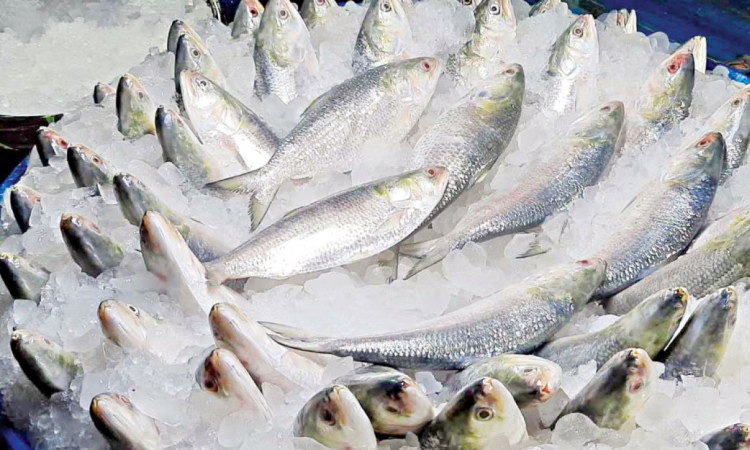News Flash


DHAKA, Oct 6, 2025 (BSS) – An extensive surveillance in rivers and marine water in 38 districts, especially in Barishal and Chattogram zones, through drones has been conducting alongside regular patrol and drive to protect mother Hilsha for their safe breeding and growth.
“We’ve been conducting extensive surveillance in rivers and marine water through drones to protect mother Hilsha to ensure safe breeding during its peak breeding period,” Deputy Director of Hilsha Management Section of Department of Fisheries (DoF) Firoz Ahamed told BSS today.
He said the surveillance through drones alongside the regular drives and patrols that began on October 3 midnight will continue until October 25 midnight as per the government order.
The government in a circular earlier imposed the 22-day fishing ban that began from October 3 midnight and will remain effective until midnight on October 25 to protect Hilsa during its peak breeding season.
The circular states that, in order to ensure safe movement and spawning of mother hilsa during its peak breeding season, all types of fishing vessels are prohibited from catching, transporting, storing, marketing, buying, selling, or exchanging hilsa and all other species of fish in Bangladesh's marine fishing zones from October 4 to October 25.
Offenders could face up to two years in prison, a fine of Taka 5,000, or both under the Fisheries Act.
Talking to BSS DoF officer Firoz Ahamed said they have engaged manpower from others sources in the campaign of protecting mother Hilsha.
The DoF have continued the extensive drives to protect the Mother Hilsha with the cooperation of Bangladesh Navy, Bangladesh Coast Guard and River Police, he said.
Assistant Director and Deputy Chief of Hilsha Management Section of DoF Muhammad Kamruzzaman told BSS that they have attached priorities to the districts of Barishal and Chattogram zones out of 38 districts to safe mother Hilsha to ensure safe breeding during the 22-day ban period.
Huge quantity of illegal fishing nets and over 100 people were arrested in the last couple of days from Barishal and Chattogram zones on charges of fishing during the ban period and using unauthorized nets in catching fishes.
The government has distributed 25 kg of rice among 15,443 families of fishermen in 165 upazilas across the country under Vulnerable Group Feeding (VGF) programme, he said.
Our Correspondent from Bhola adds: The ban, which is being enforced by the Department of Fisheries, covers a crucial 190-kilometer fisheries sanctuary spanning several major rivers in Bhola district.
To maintain compliance throughout the ban period, four specialized forces are involved in the surveillance efforts. These enforcement teams include patrols conducted by the Navy, Naval Police, Coast Guard and Air Force.
The designated fisheries sanctuary encompasses the Meghna, Tetulia, Kalabadar, Betua and Ilisha rivers. The total protected area is precisely delineated, halting all types of fishing within the limits.
Specifically, all types of fishing are halted along 90 kilometers of the Meghna River (from Char Ilisha to Char Pial) and 100 kilometers of the Tetulia River (from Bheduria to Char Rustam).
The campaign is part of the larger 'Ma Hilsa Preservation Campaign-2025', which is scheduled for 22 days. This period is calculated to include four days preceding the Ashwini Purnima and three days following the Amavasya.
Fisheries officials, along with law enforcement agencies, are participating in this massive operation.
Bhola District Fisheries Officer Iqbal Hossain confirmed that the restriction is a decision handed down by the senior government authorities.
In Bhola's seven upazilas, there are approximately 1.5 lakh registered fishermen who are fishing in the Meghna, Tetulia, Kalabadar, and Ilisharivers.
Additionally, an estimated 2.5 lakh individuals privately earn their livelihoods through fishing.
Our Patuakhali correspondent reports: Responding to the ban, most of the fishing trawlers, stationed in the Bay of Bengal, have returned to the Shibbaria River in Mahipur and Alipur since Friday morning.
Meanwhile, the fishermen have demanded an increase in the incentives provided by the government and strengthening of administrative patrols in the sea to prevent aggression by fishermen from neighboring countries.
Talking to the BSS, Kalapara Upazila Senior Fisheries Officer Apu Saha said, "Our patrols will be strong day and night to enforce the ban ... During this time, government assistance will be provided to fishermen."
Our Chattogram staff reporter writes: A 140-kilometre stretch from Mirsari upazila to Teknaf upazila has been designated as a Hilsa sanctuary, where all fishing activities, transportation, marketing, and storage of fish are strictly prohibited.
District and upazila task forces, along with law enforcement agencies, the administration, and the Department of Fisheries, have made necessary arrangements to enforce the ban.
During the prohibition period, over one lakh registered fishermen in Sitakundu, Anwara, Banskhali, Mosheshkhali, and Kutubdia, who rely on fishing Hilsa and other fish, will receive 40 kg of food aid each. Distribution will commence next week.
Acting Deputy Commissioner of Chattogram, Mohammad Kamruzzaman, urged fishermen to be patient and thus allow mother Hilsa to spawn safely to enhance future production.
Fisherman Kamal Uddin from the Banskhali area confirmed their compliance with the government's ban, stating that they have already brought their boats and nets ashore.
Fish trader Abdur Rahman from Fringi Bazar Fish Market mentioned that while they are clearing out their fish warehouse before the deadline, some fishermen are still going to the river to earn livelihood.
He suggested that the campaign would be more successful if the administration maintains a presence in the fishing villages.